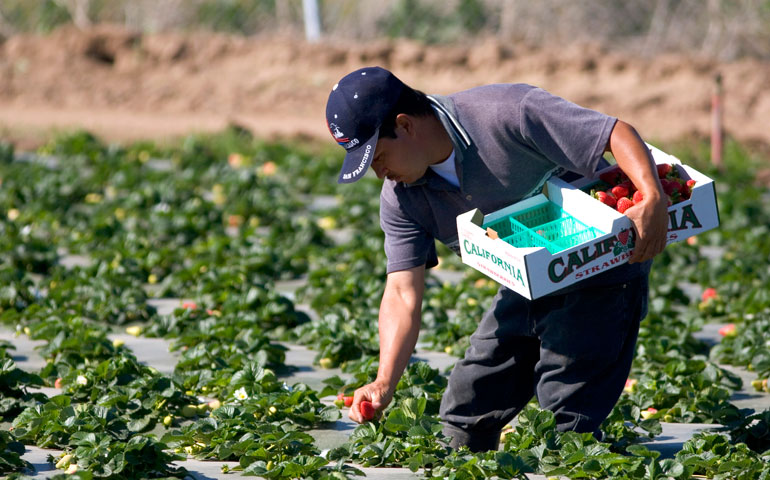
A migrant farmworker picks strawberries in Santa Maria, Calif. (Newscom/DanitaDellmont.com/David R. Frazier)
 FRESH FRUIT, BROKEN BODIES: MIGRANT FARMWORKERS IN THE UNITED STATES
FRESH FRUIT, BROKEN BODIES: MIGRANT FARMWORKERS IN THE UNITED STATES
By Seth M. Holmes, Ph.D., M.D.
Published by University of California Press, $27.95
Last spring, I took my children strawberry picking. As we chatted excitedly on the way to the "u-pick" farm, I paid little attention to the scenery we passed on the drive. Arriving at the farm, we paid to pick strawberries. The South Florida sun beat heavily on us as my kids ran around the field. Once they got tired, we purchased cinnamon rolls and strawberry shakes and sat in the shade. At the end of what my kids described as an exhausting two hours, we piled into the car. The heat and the fatigue made for a silent drive home.
This silence allowed me to examine the farms that surrounded us as we drove through the city of Homestead. I saw old school buses parked in the middle of fields, and brown and black men bent over picking strawberries and other fruits and vegetables. I imagined these men were Haitian, Central American and Mexican. Some, I assumed, were Guatemalan like my husband and oldest son. None of them paid to pick this fruit and no strawberry shake awaited them when the sun became oppressive.
This experience has left me troubled over the past year, and that feeling was only heightened after reading Seth Holmes' Fresh Fruit, Broken Bodies: Migrant Farmworkers in the United States, an ethnographic testimony to the struggles of the Triqui people of Oaxaca, Mexico. Holmes connects their everyday suffering to a broader framework of social, political and economic structures. He reveals the hierarchy of ethnicity, labor and suffering in the U.S. agricultural complex, a system of inequality that produces both structural violence and the symbolic violence of stereotypes and prejudices. This symbolic violence places the farmworker at the bottom of a hierarchy of internalized social asymmetries.
As a medical anthropologist, Holmes pays special attention to the impact that the migrant life has on the bodies of these men and women. Their bodies reveal the physical pain endured by farmworkers, as well as the mental suffering that comes from the structural violence that they experience. Holmes highlights the illnesses that plague migrant farmworkers and the inability of the health care system to help them.
The intersection of social justice and public health is an important dimension of this book. Holmes depicts a medical industry where miscommunication, cultural and language barriers, and lack of time hinder the doctor-patient relationship. He also demonstrates the manner in which farms become absorbed into a larger global, neoliberal economy that creates this social hierarchy where profit, not human life, is valued.
Opening the book with his account of attempting to illegally cross the border with a group of Triqui from San Miguel, Holmes offers an embodied ethnographic anthropology that reveals the excruciating journey across the border that is riddled with fears of robbery, dehydration, rattlesnakes and, of course, the fear of being caught. While some might critique Holmes for inserting his own journey of crossing the border and living and working with the migrant farmers so obviously into the narrative, the insights gleaned by his participation-observation are priceless. His research changed his view of migrant workers, and he invites the reader to be transformed by the lives and struggles of these faceless masses, these "nobodies," who pull our food from the earth.
In Chapter 6, Holmes raises the issue of the "normalization" of migrant workers' suffering by those who live in the areas surrounding these farms and migrant camps. However, I do not think it is just those who live around the camps who have normalized their suffering. As a society, we either turn a blind eye to the plight of these people or offer a defeated shrug. In response, Holmes calls for "pragmatic solidarity" to join in the struggles of these oppressed people, at the level of the farm, the medical industry and our everyday lives. While this book does not end on a hopeful note, it does suggest a practical approach to this injustice by calling us to use our political and economic agency to help alleviate social suffering of migrant farmworkers.
This spring my kids begged for another strawberry-picking adventure, but I couldn't allow it. Some may disagree with my decision, but I could not bring myself to turn what is abusive and oppressive work into recreation. After reading Holmes' book, I am now conflicted about my decision. My kids go to the grocery store and pick out beautiful strawberries packaged in plastic (recyclable, of course) tubs. We bring them home, wash them and enjoy a healthy snack divorced from the suffering laborer who picked them for us. Perhaps a better lesson for them is to understand the hard work and skill that goes into our agriculture. Perhaps they should sweat a little in order to truly understand the gallons of sweat produced by those who are at ground zero of our food industry: the anonymous nobodies who pick our fruits, vegetables and coffee beans. Holmes turns those nobodies into "somebodies," refusing to let their stories and their struggles melt away in the hot sun.
[Michelle A. Gonzalez is associate professor of religious studies at the University of Miami.]



